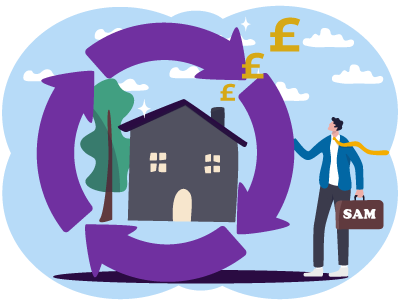Can I Transfer Property to a Limited Company Without Stamp Duty?
- You can gift property to a limited company and avoid stamp duty if you aren't connected to the company.
- Stamp Duty for transferring property to a company you're connected to is charged at the current market value.
- You can transfer property to a company without paying stamp duty if the property is already in a partnership.
Stamp Duty on transfer of property to a limited company
If a property is held under a company name, mortgage interest and other property expenses become tax deductible. This means that you can take these expenses off your income when calculating property income tax at year-end.
Most landlords gift the property to their limited company if there is no mortgage. Where there is a mortgage, you can transfer the value of the mortgage by getting a mortgage in the company name.
It doesn't matter what price you transfer the property for. The stamp duty rules are different when you transfer property to a company because they aren't based on the consideration, i.e. the money changing hands. The stamp duty is based on the property's current market value, and you'll pay the normal and additional stamp duty rates.
Legislation states you pay stamp duty on the property's market value on the transfer day.
Under section 53 of the Finance Act 2003, it states:
Deemed market value where the transaction involves connected company...The chargeable consideration for the transaction shall be taken to be not less than (a)the market value of the subject matter of the transaction as at the effective date of the transaction.
If you own your property in a partnership, then there may be no SDLT payable.
What is normally classed as consideration for land or property for SDLT?
Consideration is most commonly the amount you pay for the property, which is reflected on the contract between you and the seller, however, it can also be:
- giving of goods (giving a personal possession in exchange for the land/property);
- providing works or services (giving work or service in exchange for the land or property); release from debt; and/or
- transfer of a debt, including the balance of an outstanding mortgage;
The above rules of consideration do not apply when transferring property into a limited company that you are linked to.
Limited company Stamp Duty calculator
3 rates of stamp duty could be applied to the current market value of the property:
- Normal Rate
- Additional Rate
- Non-UK Resident
| Property Price | Standard Rate of Stamp Duty | Additional Home Rate (updated post Oct 2024 budget) | Non UK Resident Rate |
| £0 - £125,000 | 0% | 5% | 2% |
| £125,001 - £250,000 | 2% | 5% | 2% |
| £250,001 - £925,000 | 5% | 10% | 2% |
| £925,001 - £1.5 million | 10% | 15% | 2% |
| Over £1.5 million | 12% | 17% | 2% |
Use our free online stamp duty calculator to see what stamp duty you'll pay on the transfer to your company.
How to transfer property to a limited company with corporation relief
SDLT sale and purchase to your company
An alternative approach to transferring property to a limited company is selling the property to the company at market value.
This transaction will incur Capital Gains Tax on any profit between the original purchase and this sale. Additionally, the company will be liable for Stamp Duty Land Tax on the purchase price. Once the sale is complete, the property becomes an asset of the company.
- 1Instruct a solicitor - they will help with the legal process and conveyancing for a sale and purchase.
- 2Get a current market valuation of the property.
- 3Negotiate and agree on a sale price with the limited company.
- 4Your solicitor drafts and executes a sale agreement and the funds are transferred to your personal bank account.
- 5Capital Gains Tax (CGT) may be due on the sale; your solicitor will help you calculate this.
- 6HMRC and the Land Registry are informed of the sale and your solicitor helps with any Stamp Duty Land Tax payable if applicable.
Get an Online Conveyancing Quote to transfer your property into a Limited Company or call us today on 0333 344 3234.
- Fixed fee quotes.
- No obligation to proceed.
- Fast completions.
- Local knowledge.
- Gifted transfer or company mortgage.
- On 99% of lender panels.
How do you know if you are linked to a company?
Gifting property to a limited company is an option if you're not connected to the company. However, it's very unlikely that you'll gift a property to a company that you are in no way connected to because you won't see the benefit.
Under section 1122 of the Corporation Tax Act 2010, it states:
a company is connected with another person ("A") if:
- You control the company: or
- You, together with persons connected with you, have control of the company.
This means that not only will you be connected if you are the sole shareholder, you could be connected if someone else has control of the company and is connected to you by:
- Your spouse or civil partner;
- Your a relative;
- You are the spouse or civil partner of a relative;
- You are a relative of the shareholder's spouse or civil partner: or
- You are the spouse or civil partner of a relative of the shareholder's spouse or civil partner.
If you are connected in any way listed above, then you cannot gift the property to the company, and you'll pay Stamp Duty on the property's full market value.
Andrew started his career in 2000 working within conveyancing solicitor firms and grew hands-on knowledge of a wide variety of conveyancing challenges and solutions. After helping in excess of 50,000 clients in his career, he uses all this experience within his article writing for SAM, mainstream media and his self published book How to Buy a House Without Killing Anyone.
Caragh is an excellent writer and copy editor of books, news articles and editorials. She has written extensively for SAM for a variety of conveyancing, survey, property law and mortgage-related articles.










